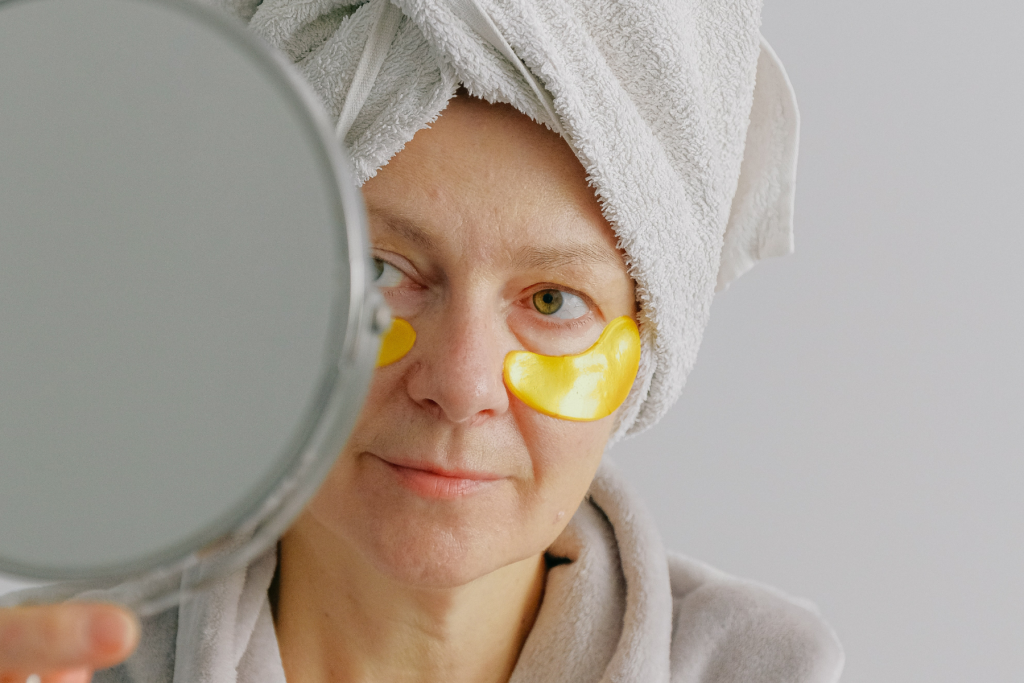Discover the amazing benefits of Vitamin C for aging skin.
How Vitamin C Benefits Aging Skin

Vitamin C is more than just a remedy for the common cold. It’s a skincare superhero that can help reverse the signs of aging and give your skin the boost it needs. In this article, we’ll uncover the secrets of how vitamin C benefits aging skin and how you can incorporate it into your daily routine. So, get ready to say hello to a youthful and radiant complexion!
Understanding the Role of Vitamin C in Skin Health
Before we dive into the benefits, let’s take a moment to understand the superhero powers of vitamin C. This powerful antioxidant helps fight free radicals, those pesky molecules that damage our skin cells and speed up the aging process. By neutralizing these free radicals, vitamin C helps protect our skin from environmental stressors like pollution and UV rays.
But that’s not all! Vitamin C also plays a vital role in collagen production, a protein responsible for maintaining the skin’s structure and elasticity. So, by boosting collagen production, vitamin C helps reduce the appearance of wrinkles and fine lines, giving you a smoother and more youthful complexion.
Did you know that vitamin C is not naturally produced by our bodies? That’s why it’s important to incorporate it into our skincare routine. Whether through topical application or dietary intake, getting enough vitamin C is essential for maintaining healthy skin.
The Science Behind Vitamin C and Skin
Now, let’s take a deep dive into the science behind vitamin C and skin. When applied topically, vitamin C gets absorbed into the skin, where it gets to work repairing and rejuvenating damaged cells. It stimulates the production of collagen and elastin, two proteins that keep our skin firm and supple.
But how does vitamin C actually work its magic? Well, it acts as a cofactor for enzymes involved in the synthesis of collagen. This means that without vitamin C, our bodies wouldn’t be able to produce enough collagen to keep our skin healthy and youthful-looking.
Additionally, vitamin C has brightening properties that can help fade dark spots and even out skin tone. So, if you’re dealing with pesky age spots or sun damage, vitamin C can come to the rescue and restore your skin’s natural radiance.
The Importance of Vitamin C in Collagen Production
We mentioned earlier that vitamin C plays a crucial role in collagen production, but let’s delve a little deeper into why this is so important. As we age, our collagen levels naturally decrease, leading to sagging skin and the formation of wrinkles. By replenishing these collagen stores with the help of vitamin C, we can combat the visible signs of aging and maintain a youthful appearance.
But don’t worry, you don’t have to start injecting vitamin C into your veins to reap these benefits. Applying it topically is enough to see amazing results. Your skin will thank you later!
It’s worth mentioning that while vitamin C is a powerful ingredient, it’s not a miracle worker. Consistency is key when it comes to skincare. Incorporating vitamin C into your daily routine, along with other healthy habits like wearing sunscreen and maintaining a balanced diet, will help you achieve the best results.
So, whether you’re looking to protect your skin from environmental damage, reduce the signs of aging, or simply achieve a brighter complexion, vitamin C is a must-have in your skincare arsenal. Start incorporating this superhero ingredient into your routine and watch your skin transform!
How Aging Affects Your Skin
Before we continue our journey with vitamin C, let’s take a moment to understand how aging impacts our skin. Aging is a natural process, and as much as we may want to stop the clock, it’s something we all go through.
The Natural Aging Process and Skin
As we age, several changes occur within our skin. The production of collagen and elastin slows down, causing the skin to lose its elasticity. Additionally, cell turnover becomes sluggish, leading to a dull and uneven complexion.
But what exactly is collagen and elastin, and why do they play such a crucial role in maintaining youthful-looking skin? Collagen is a protein that provides structure to the skin, giving it strength and firmness. Elastin, on the other hand, is responsible for the skin’s ability to stretch and bounce back. As these proteins decline with age, the skin becomes more prone to sagging and wrinkles.
Furthermore, the skin’s ability to retain moisture decreases, resulting in dryness and roughness. This lack of hydration can also contribute to the formation of fine lines and wrinkles. So, it’s essential to keep your skin hydrated and moisturized to minimize the visible signs of aging.
These factors combined create the perfect recipe for aging skin. But fear not, vitamin C is here to save the day!
External Factors That Accelerate Skin Aging
While natural aging is beyond our control, external factors can accelerate skin aging. Sun exposure, smoking, unhealthy lifestyle choices, and pollution can all wreak havoc on our skin, causing premature aging.
Let’s start with sun exposure. The sun emits harmful ultraviolet (UV) rays, which penetrate the skin and damage its underlying structure. Over time, this can lead to the breakdown of collagen and elastin, resulting in wrinkles, sunspots, and a leathery texture.
Smoking is another major culprit when it comes to skin aging. The chemicals in cigarettes constrict blood vessels, reducing blood flow to the skin. This deprives the skin of vital nutrients and oxygen, leading to a dull and lackluster complexion. Smoking also releases free radicals, which are unstable molecules that can cause oxidative stress and damage to the skin.
Unhealthy lifestyle choices, such as a poor diet and lack of exercise, can also accelerate skin aging. A diet high in processed foods and sugar can contribute to inflammation in the body, which can manifest as skin conditions like acne and rosacea. On the other hand, regular exercise promotes healthy blood circulation, delivering essential nutrients and oxygen to the skin.
Pollution is an unavoidable aspect of modern life, particularly in urban areas. The pollutants in the air, such as particulate matter and chemicals, can settle on the skin and penetrate its layers. This can lead to inflammation, clogged pores, and an overall dull complexion.
Luckily, incorporating vitamin C into your skincare routine can help combat the damage caused by these external factors. It acts as a shield, protecting your skin from the harmful effects of UV radiation and pollution. Vitamin C is also a potent antioxidant, neutralizing free radicals and reducing oxidative stress. So, make sure to slather on that vitamin C goodness and keep your skin protected!
The Benefits of Vitamin C for Aging Skin
Now that we have a solid foundation, let’s dive into the exciting part – the benefits of vitamin C for aging skin!

Vitamin C and Wrinkle Reduction
We all want to turn back the clock and banish those pesky wrinkles. Well, vitamin C is here to help you achieve just that! Its powerful antioxidant properties help combat the free radicals that contribute to wrinkle formation.
Additionally, by stimulating collagen production, vitamin C helps plump up the skin, reducing the appearance of fine lines and wrinkles. So, say goodbye to crow’s feet and hello to a smoother, more youthful complexion!
Improving Skin Tone with Vitamin C
If you’re battling with an uneven skin tone or dark spots, vitamin C can be your secret weapon. Its brightening properties help fade hyperpigmentation and even out your complexion.
With regular use, you’ll notice that your skin looks more radiant and glowing. So wave goodbye to dullness and embrace a more luminous complexion with the help of vitamin C!
Vitamin C and Its Role in Hydration
Moisture is key when it comes to maintaining youthful skin. And guess what? Vitamin C can help with that too! It aids in retaining moisture and preventing water loss from the skin, keeping it plump and hydrated.
So, if you’re struggling with dryness or rough texture, incorporating a vitamin C product into your routine can do wonders for your skin’s hydration levels. Get ready for that dewy glow!
How to Incorporate Vitamin C into Your Skincare Routine
Now that we’re convinced of vitamin C’s magical powers, it’s time to learn how to incorporate it into our daily skincare routine.
Choosing the Right Vitamin C Product
With so many vitamin C products on the market, finding the right one can feel overwhelming. Look for products that contain a stable form of vitamin C, such as L-ascorbic acid, as this ensures maximum efficacy.
Additionally, pay attention to the concentration of vitamin C. A concentration of 10-20% is considered effective for most skin types. And don’t forget to check the product’s packaging – opt for dark, airtight containers to protect the vitamin C from oxidation.
When and How to Apply Vitamin C
Now that you’ve found your perfect vitamin C product, it’s time to integrate it into your skincare routine. The best time to apply vitamin C is in the morning, after cleansing and toning your skin.
Simply dispense a few drops of your chosen vitamin C serum or cream onto your fingertips and gently massage it into your face and neck. Follow up with your favorite moisturizer and sunscreen for added protection.
Remember to give your skin some time to absorb the vitamin C before moving on to the next step of your routine. Patience is a virtue, and your skin will thank you for it!
Precautions and Possible Side Effects of Using Vitamin C
As amazing as vitamin C is, it’s essential to be aware of any potential precautions or side effects.
Understanding the Potential Risks
While vitamin C is generally safe for most skin types, some people may experience mild irritation or allergic reactions. To minimize the risk, it’s a good idea to perform a patch test before applying it all over your face.
If you notice any redness, itching, or irritation, discontinue use immediately and consult a dermatologist. Your skin deserves only the best, so listen to its needs and act accordingly.
How to Minimize Side Effects
If you’re new to vitamin C or have sensitive skin, it’s best to start with a lower concentration and gradually increase it over time. This allows your skin to acclimate to the product and reduces the risk of irritation.
Additionally, using a moisturizer after applying vitamin C can help minimize any potential dryness or sensitivity. Remember, skincare is all about finding what works best for you, so take the time to listen to your skin’s needs and adjust your routine accordingly.
So there you have it, the secrets of how vitamin C benefits aging skin. From boosting collagen production to protecting against environmental stressors, vitamin C is a true superhero in the world of skincare.
So, embrace the power of vitamin C and say hello to a more youthful and radiant complexion. Your skin will thank you later!





